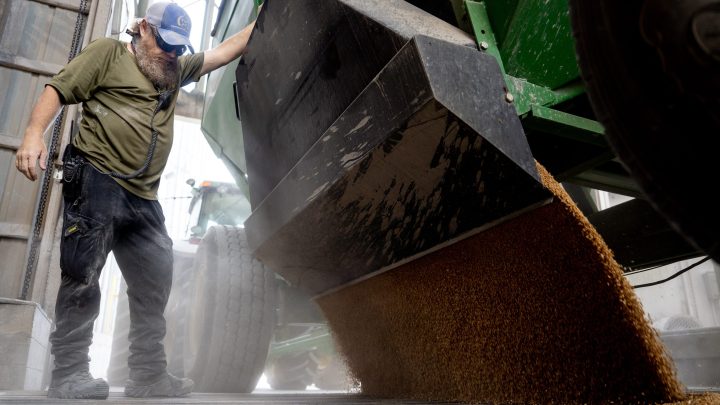
Grain storage costs have soared. That puts Midwest elevators and co-ops in a tough spot.
Grain storage costs have soared. That puts Midwest elevators and co-ops in a tough spot.

When consumers buy bread in the store, they may not think about all the costs that go into it — like the expense of storing grain. But that’s something farmers and millers think about these days because grain storage costs are the highest on record.
For Scott Harre, a grain merchandiser in the small town of Okawville, Illinois, it’s become more expensive to store wheat, corn and soybeans.
“It’s frustrating from the standpoint you’re not able to make the margins that you intend and think you should be able to make,” he said. “It’s not really any fault of your own from the standpoint of you’re just getting beat by the situation that’s being handed to you.”
The situation that’s being handed to Harre is high grain prices and high interest rates.
“You combine these two factors, and what we have is the highest borrowing cost for storing grain on record,” said Tanner Ehmke, an economist with CoBank, which is one of the largest lenders to co-ops and private elevators in the country.
Higher grain prices can be great for farmers. But when a grain elevator buys from a farmer, those higher prices are passed on to it. The elevator stores the grain until a flour mill or ethanol plant buys it, for example.
With storage so expensive, elevators don’t want to buy the grain too early.
“It’s the hot potato, and who’s going to get stuck holding it? Well, it’ll probably be the co-op because they’re obligated to hold it,” Ehmke said.
Co-ops are owned by farmers, so they have to buy the grain when farmers are ready to sell — and that means co-ops might be paying a little less than private elevators this year.
“That is the beauty and the curse of a market. For everybody that’s happy in that market, there’s probably another person that’s unhappy,” said Chad Hart, an agricultural economics professor at Iowa State University.
Those who store the grain are likely the unhappy ones right now, but they’re used to uncertainties, Hart said.
“Most of your elevators, your co-ops, they’ve been through periods like this before,” he said. “They can do some moves to help manage the financial risks that they face. Given the increased cost, it does mean that any misstep they might make financially has a bigger impact on their bottom line.”
Consumers, however, probably won’t feel it in their bottom lines because there are a lot of steps between the farmer and them.
For example, a loaf of bread starts with a farmer growing the wheat. A grain elevator stores it and then sells it to a flour mill. When the flour is produced, the mill sells to a bakery, which bakes the bread and sells it to a grocery store.
Along the grain chain, each player along the way will eat some of that high storage cost, Ehmke said.
“By the time you get to the consumer, there’s been so much processing that they’re not really going to recognize what’s going on with the price,” Ehmke said. “They’re not directly impacted by what’s going on with the cost of storage.”
Scott Harre with the rural Illinois co-op said current market conditions have him watching two things: the Federal Reserve’s next interest rate move and the Midwest’s drought.
“Here in the next four weeks is going to be very critical on whether we’re going to have a good corn crop or not,” Harre said.
If the drought worsens, grain prices and the cost to store it could climb even higher.
There’s a lot happening in the world. Through it all, Marketplace is here for you.
You rely on Marketplace to break down the world’s events and tell you how it affects you in a fact-based, approachable way. We rely on your financial support to keep making that possible.
Your donation today powers the independent journalism that you rely on. For just $5/month, you can help sustain Marketplace so we can keep reporting on the things that matter to you.

















